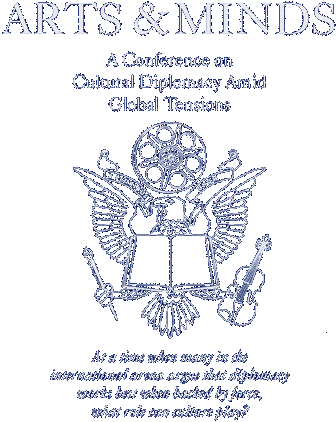
| National Arts Journalism Program
2950 Broadway, Mail Code 7200 New York, NY 10027 Directions tel: 212.854.1912, fax: 212.854.8129 email: najp@columbia.edu |

|
Presented by The National Arts Journalism
Program, Columbia University
Graduate School of Journalism Support is generously provided by The Doris Duke Charitable Foundation and The Rockefeller Foundation. Summary | Schedule | View publication Conference Summary Mounting concern about America’s
image abroad has focused new attention on the use of art and culture
as a diplomatic tool. Reviving the official deployment of culture
to boost receptivity to American values has been the subject of
recent debate, with the chairman of the House Committee on International
Relations asking, "How is it that the country that invented
Hollywood and Madison Avenue has allowed such a destructive and
parodied image of itself?" Preliminary Conference Schedule DAY ONE: Monday, April 14, 4:30-6:45 P.M 3:30-4:30 p.m.: Registration opens 4:30-5:00 p.m.: Conference Welcome: Michael Janeway, director, National Arts Journalism Program; Ellen Lovell, president and CEO, Center for Arts & Culture; Noreen Tomassi, president, Arts International Introduction: Andras Szanto, deputy director, National Arts Journalism Program 5:00-6:45 p.m.: America¨s Global Image: Short-Term
Branding or Long-Term Exchange? Plenary Presentation: "Cultural Diplomacy and U.S. Security" by Helena Kane Finn, fellow in diplomatic studies, Council on Foreign Relations, and former acting assistant secretary of state, Bureau of Educational and Cultural Affairs, Department of State Moderator: Hodding Carter, president, Knight Foundation, and former State Department spokesman Panelists: Andrew Kohut, director, The Pew Research Center for the People and the Press; Richard Bulliet, professor of history, Columbia University; Joshua Muravchik, resident scholar, American Enterprise Institute; John Romano, screenwriter and producer DAY TWO: Tuesday, April 15, 9 A.M.-4:30 P.M 9-9:30 a.m.: Welcome & Introduction: Michael Z. Wise, NAJP research fellow and contributing editor, Architecture Keynote Address: Trisha Brown, choreographer and artistic director, Trisha Brown Dance Company 9:30-10:45 a.m.: Cultural Diplomacy in Historical
Perspective—From 19th Century World’s Fairs to the Cold
War Moderator: Volker Berghahn, professor of history, Columbia University Panelists: John Brown, research associate, Georgetown University, and U.S. Foreign Service cultural affairs officer; Frank Ninkovich, professor of history, St. John's University; Penny Von Eschen, professor of history, University of Michigan; Michael Warner, historian, Central Intelligence Agency 11 a.m.-12:30 p.m.: The Cultural Diplomacy of Other
Nations Moderator: Alexander Stille, author and editor, Correspondence: An International Review of Culture & Society Panelists: Peter Soetje, director, Goethe Institut, New York; Jean-Rene Gehan, cultural counselor, French Embassy; Andy Mackay, director, British Council USA; Arturo Sarukhan, consul general of Mexico; Jeanne Wikler, general director for cultural affairs, U.S., Consulate General of the Netherlands 12:30-1:30 p.m.: Lunch Break 1:30-3 p.m.: Can Cultural Diplomacy Improve America’s
Standing in the Islamic World? Moderator: Caryle Murphy, religion reporter, The Washington Post Panelists: Peter Awn, dean, School of General Studies, and professor of religion, Columbia University; Bert Kleinman, senior managing consultant to Radio Sawa and Radio Farda; Samer Shehata, professor of Arab studies, Georgetown University; Faouzi Skali, founder and director, Fes Festival of World Sacred Music 3:15-4:30 p.m.: Culture as a Tool of Statecraft:
Case Studies Moderator: Celestine Bohlen, culture writer, The New York Times Panelists: Richard Ford, Pulitzer Prize-winning novelist; David Fraher, executive director, Arts Midwest; David Denby, film critic, The New Yorker; Felix Rohatyn, president, Rohatyn Associates, and former U.S. ambassador to France; Cynthia Schneider, professor of art history, Georgetown University, and former U.S. ambassador to the Netherlands |